Online Health & Safety for Food Handlers Course
Quantity: 1

Duration 2-3 hours
Last audited 13th March 2023
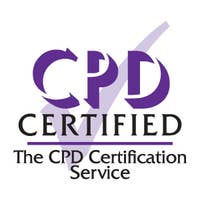
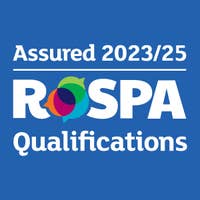


100% online training
Start when you like
Learn on any device (desktop, mobile or tablet)
Instant assessment and result
1 learner per course
Train teams of all sizes
Bulk discounts starting at 10% off 10 courses
Learn on any device (desktop, mobile or tablet)
Includes a 10% discount for 10+ courses
The work activities and environment in a food premises can pose numerous health and safety risks to food handlers. In order to comply with the law and keep people free of ill-health or injury, these hazards must be suitably and sufficiently controlled. This is primarily the duty of the business owner, but all food handlers have a part to play in keeping the workplace safe.
This course familiarises learners with the types of hazards that may exist in their food premises. It teaches them what to do to help uphold health and safety measures put in place by their employer, and how to carry out work activities in a way that reduces risk. With this knowledge, food handlers will be fully equipped to adopt good health and safety practices and ensure everyone’s wellbeing is upheld.
100% online training
Access anywhere
Same day digital certificate
Printed certificate posted next working day
Full audio voiceover
Unlimited assessment attempts
Developed by health and safety professionals
Accredited by CP, assured by RoSPA Qualifications and endorsed by the Institute of Hospitality
By the end of this course learners will:
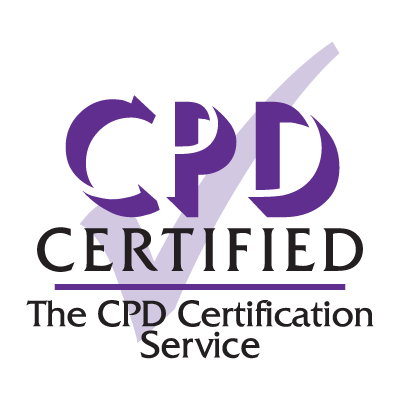
Accredited by CPD
All of our courses are accredited by the CPD Certification Service as conforming to universally accepted Continuing Professional Development (CPD) guidelines.

Assured by RoSPA Qualifications
This course is also assured by the Royal Society for the Prevention of Accidents through their RoSPA Qualifications Assurance System, as providing up-to-date, quality and content-approved training.

Endorsed by the Institute of Hospitality
Additionally, this course is endorsed by the Institute of Hospitality as providing independently-evaluated, quality content that teaches good practice standards.
Recommended renewal:
1 year
What does this mean? This certificate does not have an expiry date, however, based on industry best practice guidelines there is a recommended renewal period.
Our in-house Learning Designers develop all of our courses to give you and your learners the most engaging training possible.
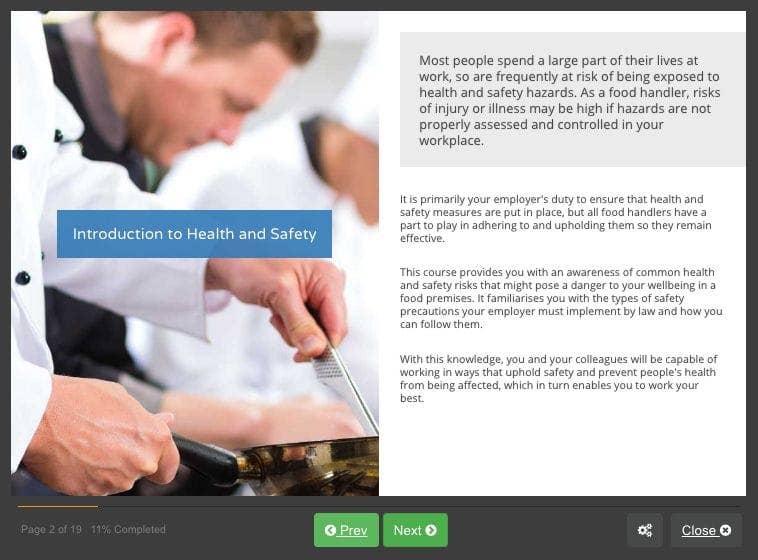
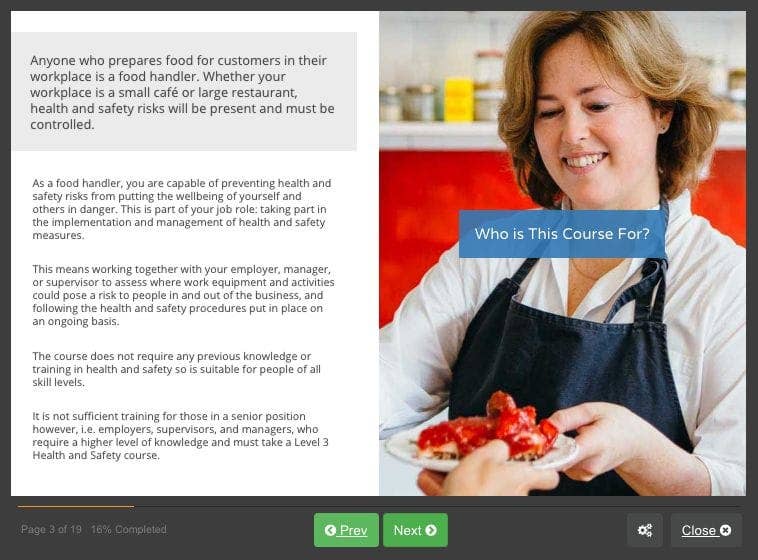
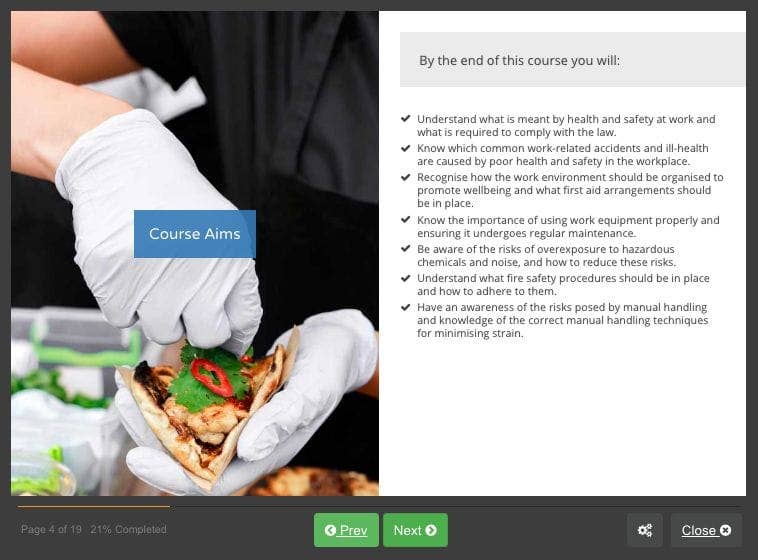
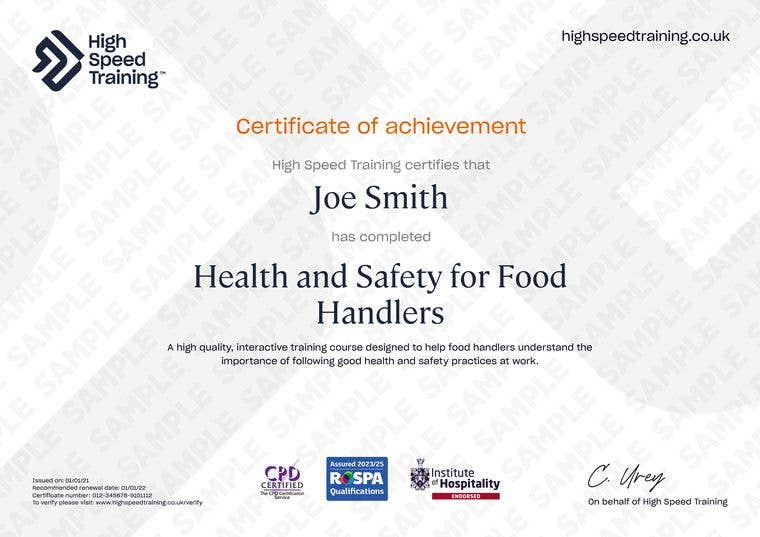




What is health and safety at work?, what is a hazard?, what is a risk?, what are common accidents?, what are common illnesses?, statistics on injuries and illnesses, and why is health and safety important?
Legislation, who enforces the law?, employer duties, risk assessments, RIDDOR, and employee duties.
Welfare provisions, work-related stress, causes of stress, effects of stress, conflict at work, first aid, and health surveillance.
Risks posed by work equipment, examples of hazardous equipment, selecting equipment, training, inspecting equipment, pre-use checks, control measures, personal protective equipment, and employee duties.
What is a hazardous substance?, sources of hazardous substances, examples of hazardous substances, chemical labelling, Safety Data Sheets, risks posed by hazardous substances, control measures, Workplace Exposure Limits, employee duties, and cleaning activities.
Noise at work, the effects of noise, measuring noise, employer duties, control measures, personal protective equipment, and employee duties.
Electricity, dangers of electricity, fire, the fire triangle, explosions, employer duties, fire safety procedures, and employee duties.
What is manual handling, manual handling injuries, manual handling risks, technical measures, organisational measures, information and training, and correct handling techniques.
Once you have completed all of the online training material you will be able to take the online assessment. The assessment consists of 15 multiple choice questions with a pass mark of 80%. The answers are marked instantly so you will know whether you have passed as soon as you finish.
If you don’t pass the assessment you can review the course material and take the assessment again as many times as necessary at no extra charge.
This health and safety for food handlers course is suitable for caterers, hospitality workers; anyone directly involved in food preparation activities in their workplace. It requires no previous knowledge so can be taken by anyone at any level – it fully explains what their duties are for reducing risks and adhering to health and safety measures as an employee and provides relevant examples to the food industry.
Anyone who is in charge of a food premises or in a senior position requires a higher level of knowledge: they must take a Level 3 Health and Safety training course.

In partnership with
Paul Turner
Senior Environmental Health Officer
Paul Turner is a Senior Environmental Health Officer at North Yorkshire Council with a great passion for the highest standards of food safety. As well as holding a degree in Environmental Health and a HND in Applied Science (Biology) Paul has completed the following: Certificate of Registration with Environmental Health Officers Registration Board, Assessment of Professional Competence (CPD), ISO 9000:2000 Lead Auditor qualification and has Chartered status from CIEH.
Paul has 30 years of experience in the sector working for local authorities and is on the Food Standards Agency’s (FSA) working group and is a Local Authority member of the FSA group contributing to their Register a Food Business (RAFB) service.
Paul is an experienced public speaker on food safety who has developed and delivered training on behalf of the Food Standards Agency and others in the sector as he continues his drive to ensure the highest standards of food safety.